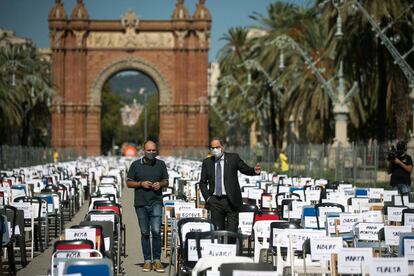Covid-19 concerns reduce scale of Catalonia Day celebrations
Pro-independence association ANC defends the need for the public events despite a call by the Barcelona Medical Association to cancel them

Coronavirus health restrictions are reducing the size and scope of public events for this year’s Catalonia Day, held every September 11 to mark the anniversary of the fall of Barcelona in 1714 during the War of Spanish Succession.
As Spain struggles through a second wave of Covid-19 infections, a pro-independence organization called Assemblea Nacional Catalana (ANC) is still hoping to bring out 48,000 people to 90 parts of the northeastern region despite recommendations from the Barcelona Medical Association to cancel these events out of safety concerns.
ANC president Elisenda Paluzie on Friday defended the “static demonstrations” that her group has planned for the day. “We want to defend the right to demonstrate safely, and that is why we have adopted all the measures established by [civil protection agency] Procicat,” she said. “We will prove that we are able to organize Covid-adapted mobilizations, and precisely because there is a crisis, the need for independence is even more urgent, because we want a state that works for the interests of citizens.”
For the first time, members of the government were not taking part in these events. In fact, the Catalan executive only had one official event on its agenda, the traditional offering of flowers at the foot of the statue of Rafael Casanova, a hero of the 1714 Siege of Barcelona.
Catalan premier Quim Torra and Meritxell Budó, the spokesperson for the pro-independence government, made remarks about the existence of “political prisoners and exiles” in Catalonia and condemned “state repression” by Spain at a subdued event where there was no music band and the delegations of politicians and public officials who showed up were notably smaller than in the past.
The Covid-19 pandemic is also expected to reduce turnout at the street marches that take place every September 11 in the evening. In 2012, The ANC turned the traditional event into an expression of support for secession from Spain, drawing record numbers of over one million marchers in Barcelona until last year, when the figure was closer to 600,000 according to the municipal police.
Barcelona Mayor Ada Colau avoided making political statements and simply said that this year’s Diada “is not the one that we wanted.” She also asked citizens to “take care of one another and join forces, because there are difficult months ahead and we all need to give the best of ourselves.”
English version by Susana Urra.
Tu suscripción se está usando en otro dispositivo
¿Quieres añadir otro usuario a tu suscripción?
Si continúas leyendo en este dispositivo, no se podrá leer en el otro.
FlechaTu suscripción se está usando en otro dispositivo y solo puedes acceder a EL PAÍS desde un dispositivo a la vez.
Si quieres compartir tu cuenta, cambia tu suscripción a la modalidad Premium, así podrás añadir otro usuario. Cada uno accederá con su propia cuenta de email, lo que os permitirá personalizar vuestra experiencia en EL PAÍS.
¿Tienes una suscripción de empresa? Accede aquí para contratar más cuentas.
En el caso de no saber quién está usando tu cuenta, te recomendamos cambiar tu contraseña aquí.
Si decides continuar compartiendo tu cuenta, este mensaje se mostrará en tu dispositivo y en el de la otra persona que está usando tu cuenta de forma indefinida, afectando a tu experiencia de lectura. Puedes consultar aquí los términos y condiciones de la suscripción digital.








































